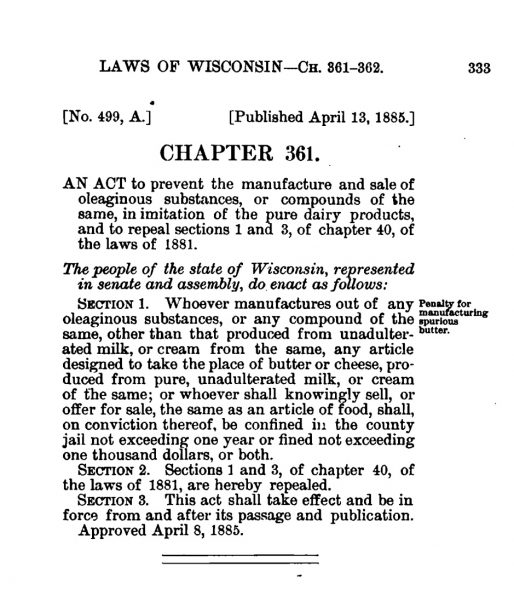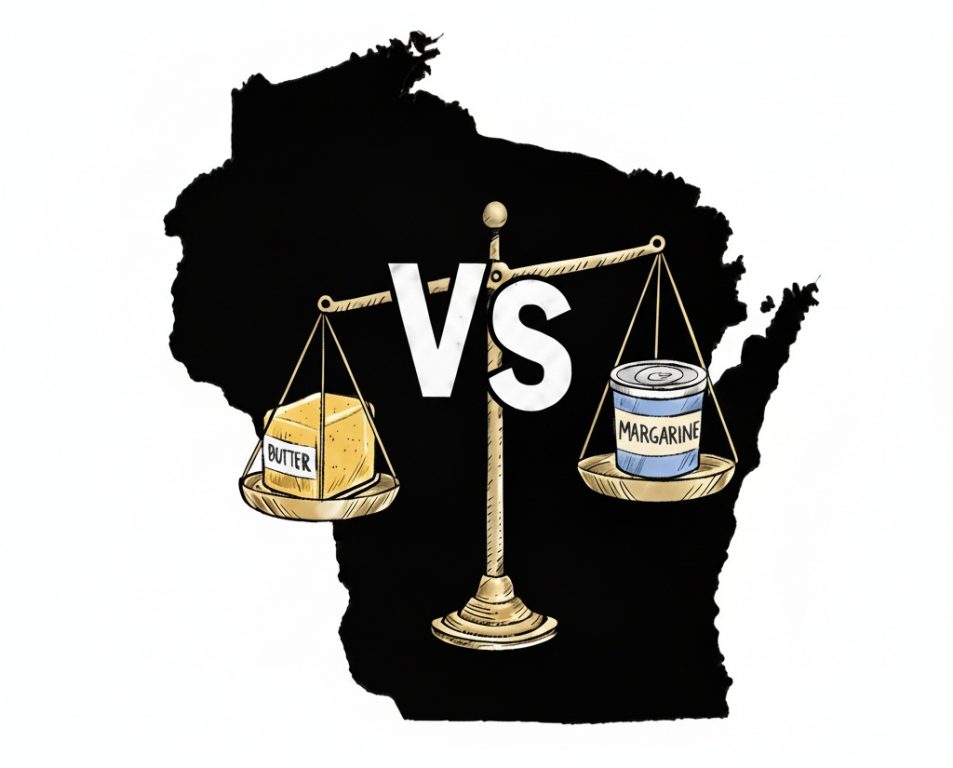It’s Butter Vs Margarine. Again
140 years after original ban on 'oleo,' legislators propose limits on its use.
The butter versus margarine debate is back on the menu in the dairy state.
A bipartisan bill introduced in the state Senate earlier this month would tighten some of the state’s enduring restrictions on margarine, the origins of which trace back to the 1800s.
Wisconsin law currently prohibits serving margarine as a substitute for table butter to students, patients or inmates of any state institution. Public eating places are also barred from selling colored margarine as a substitute for table butter unless patrons specifically request it.
Violating these laws is a criminal offense and could lead to a fine between $100 and $500, imprisonment up to three months or both.

Screen capture of a Wisconsin law from 1885 that prohibited the manufacture and sale of “oleaginous substances” or margarine.
The new bill would broaden the substitution ban to apply to butter rather than just table butter. The proposed legislation would also bar public, private and tribal schools from serving the substitute or including it in meals served to the same students. Exceptions apply for individual students with specified needs.
Two Democrats and 14 Republicans – several of whom operate farms, grew up on a farm or have received awards from the Dairy Business Association – are pushing the proposal forward. The bill went to a committee, where it must pass before moving to the whole legislature for a vote, the same day it was introduced.
Bill authors state Sen. Howard Marklein (R-Spring Green) and state Rep. Todd Novak (R-Dodgeville) were both raised on farms and have each received thousands of dollars in contributions from dairy interests throughout the years, according to profiles from the Wisconsin Democracy Campaign.
“I grew up milking cows,” Novak told The Badger Project. “This is kind of the type of bill I love doing because it’s constituent-oriented.”
Novak said his district is one of the most “ag-dependent” in the state. The bill was a response to calls from family farmers who voiced strong opposition to margarine in schools at a September meeting of the Iowa County Farm Bureau that Novak and Marklein attended.
Novak said he didn’t anticipate a lot of opposition to the bill. While one school district recently switched from butter to margarine, Novak said roughly 99% of the other school districts in his political district serve butter.
Democratic state Reps. Vincent Miresse of Stevens Point and Russell Goodwin of Milwaukee joined Republicans to support the bill.
“They’re dairy farmers, and it really irritated them,” Marklein said. “This is America’s Dairyland, and so I don’t think it’s unreasonable to expect that our schools will serve something that comes from our dairy cows.”
The regulation of margarine has a long history in the U.S. and especially in Wisconsin, where butter factors into the state’s massive dairy industry. The state’s more than 5,000 dairy farms contribute nearly $53 billion every year to Wisconsin’s economy, according to the Department of Agriculture, Trade and Consumer Protection.
A history of margarine
Margarine was invented by a French chemist in 1869 and soon made it across the Atlantic as a cheaper butter alternative, according to a resource from the National Conference of State Legislatures.
Margarine, which contains mostly unsaturated fats, is commonly made from vegetable oils, whereas butter, mostly saturated fat, is derived from animal products. Butter’s saturated fats are worse for
When margarine arrived in the U.S., the national dairy industry saw the spreadable substitute as a threat and successfully lobbied against it. Congress passed the Oleomargarine Act in 1886, which taxed margarine and required its manufacturers and distributors to get licenses, the national conference wrote. Dozens of states regulated margarine as well. The crackdown fostered a black market, and a few fraudsters even landed in prison.
To make it appear like butter, margarine, naturally white, was often tinted yellow. Wisconsin joined 31 other states to ban the manufacture and sale of yellow-tinted margarine, according to a U.S. National Archives blog. New Hampshire went so far as to mandate that margarine be tinted pink, but the United States Supreme Court overturned that law in 1898.
But butter was scarce during the Great Depression and World War II, and the public more regularly consumed margarine, according to a 1965 report from the Wisconsin Legislative Reference Bureau. By the 1950s, there was a growing distaste for regulating margarine. The federal government soon repealed its margarine tax, and many states reined in their own regulations. Wisconsin was the last state to reverse its ban on selling yellow margarine in 1967. State law still dedicates about 500 words to the substance.
The Badger Project is a nonpartisan, citizen-supported journalism nonprofit in Wisconsin.
This article first appeared on The Badger Project and is republished here under a Creative Commons Attribution-NoDerivatives 4.0 International License.
If you think stories like this are important, become a member of Urban Milwaukee and help support real, independent journalism. Plus you get some cool added benefits.






















wow i learned a lot from this
“Butter makes everything better!”